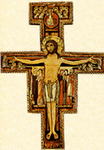Most Holy Name of Jesus! That's the memorial for today, 3 January 2008.
Many Catholic churches and Catholic schools bear this name. For instance, the Cathedral Church in the Archdiocese of Chicago is named after the Holy Name of Jesus. There is even a Catholic organization of laymen called the Holy Name Society.
Unfortunately, as I am sure we all know, the Name of the Lord Jesus is not always (ahem!) invoked reverently. Frequently it is invoked (loudly) when there is a great disappointment, frustration or other anger-inducing incident (shall we say, hitting one's thumb with a hammer?).
Back in the later Middle Ages, St. Bernardine of Siena, a reformer of the Franciscan friars and renowned preacher in 15th century Italy sought to call people to invoke the Holy Name of Jesus as a way of countering not only vulgarity, but interfamily warfare.
At that time many influential families in Italy were at odds with one another (remember Shakespeare's Romeo and Juliet [Capulets v. Montagues]?). They used logos with their respective family crests to "rally the troops". In many ways it was like gang warfare.

St. Bernardine, taking the Gospel of Jesus seriously and being a man of his times, was inspired to become a peacemaker. He used the logo of "IHS", from the Greek word "IHCOUC" (
Iesous = Jesus) in the midst of a sunburst to proclaim the Holy Name of Jesus Christ. He had some success at this, calling families and their armies to put down their arms and to reconcile.
Unfortunately, the Franciscan preacher had his detractors. This resulted in Bernardine being called before the Roman Inquisition on charges of heresy! (Some suggested that the use of the logo was tantamount to idolatry.) He was acquitted, but also chastened.
St. Bernardine never gave up, though, on preaching the Gospel of Jesus Christ, peace and reconciliation in the name of the Savior, and reverence for the Holy Name. He took it quite seriously when the New Testament states that there is no other name by which human beings can be saved (Acts 4:12).
 St. Bernardine of Siena, OFM, by El Greco
St. Bernardine of Siena, OFM, by El GrecoHe received permission eventually to use the logo he and the Franciscan friars had designed. Eventually others also embraced this movement and subsequently, (well after St. Bernardine) in the early 1700s, the Feast of the Holy Name of Jesus was added to the Roman Calendar. The Franciscans have celebrated this on January 3rd.
(
When the Roman Calendar was revised in 1969 the Memorial of the Holy Name of Jesus was removed as a universal feast of the Church [although the Franciscans continued to celebrate it]; it was restored by the late Pope John Paul II in the early 2000s, again on January 3rd).
In fact, the name
Jesus comes from the Hebrew (
Yehoshua; or
Yeshua) and is also rendered "Joshua". It means "salvation", as in, "Yahweh saves his people". Like the peoples of ancient times and today's peoples of traditional cultures, one's name refers to what one is destined to be or do. In the Gospels which we heard and read prior to Christmas Day, we learned that Jesus is "to save his people from their sins" (Matthew 1:21). His name reflects who he is and what his life was all about.
Scripture also promises that "all who call upon the Name of the Lord shall be saved!" (Acts 2:21; Joel 3:5a).
What about
your name? What does it mean? Were you named after a relative or significant person in your family's life? Why did your parents (or other person) choose that name for YOU? Do you live up to it? Is your life fulfilling what your name means?
If you don't know what your name means, I encourage you to look it up (you can do so, of course, on the Internet). It is something you can take to the Lord in your own prayer today.






